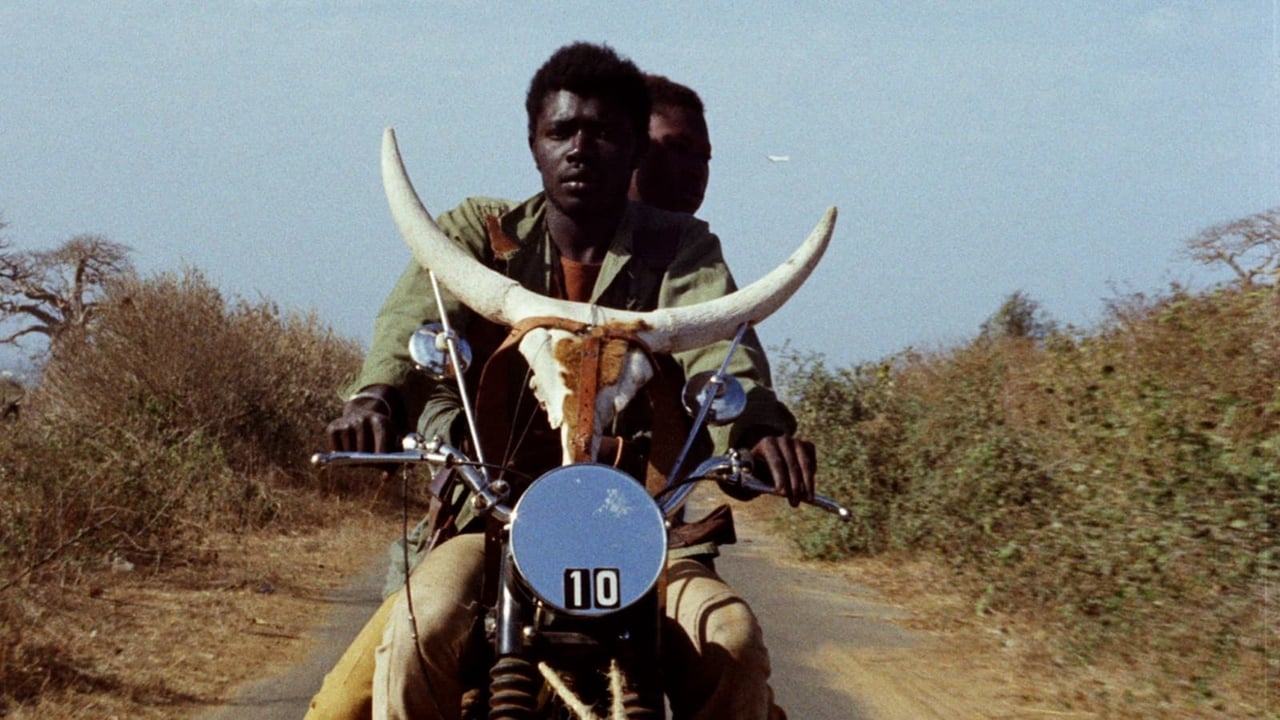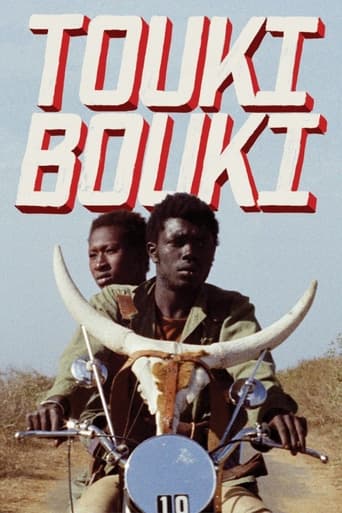Solemplex
To me, this movie is perfection.
VeteranLight
I don't have all the words right now but this film is a work of art.
Voxitype
Good films always raise compelling questions, whether the format is fiction or documentary fact.
Cooktopi
The acting in this movie is really good.
FilmCriticLalitRao
It is indeed hard to believe that over the years, the magic of Europe as a golden land of opportunities has not faded. It is also unfortunate that Europe continues to charm countless innocent, impoverished men and women from Asia, Africa and Latin America to risk their lives in order to reach European soil with the sole objective of making a lot of money. Some of these daredevils can be found in the Senegalese film 'Touki Bouki' directed by maverick Djibril Diop Mambéty. He has ensured that Senegal is not shown in any kind of bad light as hunger and scenes of poverty which have become regular features of other African films about Africa have been deliberately avoided. It is a mystery how Touki Bouki's comical situations have been termed as surreal. They are as close as possible to daily lives which prove out to be a great test for everybody. Watching the comic scenes with utmost attention, one realizes how some borders are closely guarded so that Paris continues to be far for many impoverished African youngsters. Lastly, some scenes of cruelty towards animals might drive some viewers to start hating this film. This is the only major imperfection which one can detect in this film.
trpuk1968
I recently showed this film to a group of students so what follows is a condensed version of the worksheet I gave them. The questions I give hopefully can assist others in making meaning from the film.Touki Bouki can best be made sense of in the following way: It operates through allusion and symbolism. Through the story of two young lovers, Mory and Fanta, clashing with the older generation, yearning to leave for Paris, Mambety puts on screen his vision of a country where the weight of thousands of years of tradition collides head on with the modernity of a newly emergent Senegal.Allusion...an implied or indirect reference hinting at something Symbol...something that stands for something else...something concrete that represents or suggests another thing that cannot in itself be represented or visualised...for example a lion symbolises courageThink about what you have seen (and heard!) in the film, paying special attention to: Mory's motorbike – what is it decorated with? What do those objects remind you of? Fanta ties it to a tree, in the midst of a herd of cows...is there a connection to the cows? The long scene in the first half of the film, when there are lots of shots of the sea, then we see Mory and Fanta together on the cliffs talking about leaving for FranceThe transformation of the Aunt from an unsympathetic character in the first half of the film to a praise singer in the second.Charlie's car which Mory and Fanta ride off in after robbing him is a Citroen painted in the flag of which country? How is it positioned in relation to the motorbike and the welcomers?1. How do you think the following things are alluded to in the film?The act of lovemaking The city of Paris The cycles of life – birth, death, birth2. How do you think the following things are symbolised in the film?African tradition African modernity – this film is made soon after Senegal gained independence The ties which hold us, such as family, friends, our familiar environment Colonial power The primitiveOther points to consider...Mambety inserts documentary footage from actual events, such as the women at the well, a wrestling competition, street children and a Presidential motorcade, into a fiction film. Do these scenes have anything to do with the story? What effect do they have on you, the viewer? What's your response to them? Why might they be in the film?Certain images and sounds are repeated in the film, such as the ocean, the crows, the cries of the taxi driver who runs away from the box then repeated by the caveman. What effect does this have? Does it 'organize' the film in any way?Answers... Mory's motorbike symbolizes Africa, in the scene after they ve robbed Charlie, it s positioned in such a way against the Citroen that the two seem oppositional. The Citroen is a French car decorated with the US flag stars and stripes so representing both French colonialism and US imperialism. The sea is a symbol for lovemaking. The cycles of nature are implied in the scenes of cattle slaughter and goat being sacrificed. Fanta ties the motorbike up as if shes trying to hold at bay the forces of modernity, of change. is the film trying to reconcile two opposing aspects, yearning for the past and tradition while simultaneously embracing modernity, the new? Whose the weird, white looking caveman up in the tree? Its as if Mambety shoves our images of 'primitive' Africans back in faces, also in the dream sequence when Mory and Fanta sit in the car, dressed in 1930s clothes smoking, being sung praises by Aminata Fal is a parody of successful Europeans. There's so much I d love to write about this film...Paris is reduced to a notion, an idea, a fantasy, brought to life through a clichéd song by Josephine Baker. On another level I read Touki Bouki as being about how Europe positions Africa and Africa positions Europe as exotic other. I m running out of space here, loads I could write about this film, hope this is useful, ENJOY!
mcfloodhorse
Disorienting and at times even a bit schizophrenic, this is an extraordinarily vibrant, pulsating, and eccentric film. Comparisons to the anarchic, jumpy, free-associative style of the French New Wavers are not far off, but there's something much more erotic and carnal in the film's playfulness.The story of self-assured college beauty Anta and her fella - Mory the motorcycle-riding herdsman - starts in Dakar and wistfully wanders toward Paris, the seemingly unattainable city of their dreams. Their get-rich-quick schemes and the breezy, colorful manner in which they unfold are funny and inspired.Along the way, there are sequences of both utter hilarity and genuine depth, although the film does sometimes seem unsure of its many potentially-symbolic representations. But the stylistic narrative and experimental technical aspects are so full of ideas that talk of the film's minor weaknesses seems trivial.The soundtrack is outstanding, full of syncopation and polyrhythms pacing the film and giving a rich texture to the images. And there's constant movement, until the film's denouement where character, story, camera and concept fuse together in common paralysis, where all seems frozen in reflection.
chewbaccuh
First of all, I want to make it clear that I am a foreign film lover. If you aren't, don't bother with this film because you will hate it.This film is interesting because it shows the life of the poor and underclass in Africa, and gives a brief glimpse into the rich when the lead character of the movie visits a gay man.There are subtle references...some insulting...on the various types of people who come and go in the film. The lazy government employee (the postman), the corrupt government employee (the policemen are show twice in the film of either taking bribes or were implicated in it), the corrupt government leaders (the title character even imagines himself one, riding in a parade in front of the poor), the rich whites (who make racist remarks on the boat about the Africans while showing a pet dog better off than most people in the country), and student rebels (who tie up the character on a truck and are no better than the corrupt government officials), a gambler, and wrestlers.But the narrative is confusing, as if those who made it were in first year of film school and just got their camera. What does it mean about the cattle being slaughtered? Are Africans being led to the slaughter? In the end why does the lead character run away from the boat that was to take him to Paris, where he dreams throughout the film of going? What is the near white primitive caveman doing riding his motorbike? What happened to the skeleton in the trunk they had stolen (they thought they were stealing money) Did it mean something else?? Who knows? There is no explaining of it by the director.The film does offer the beautiful colors and landscapes of Africa and you can almost smell the sweat and odors of the places visited.

